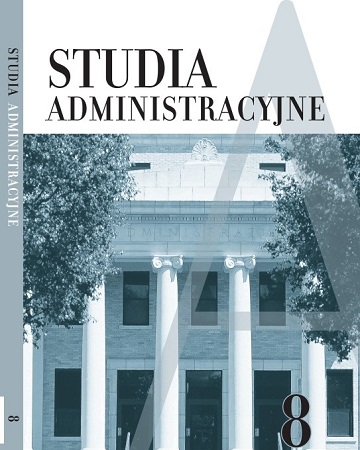





| Authors: |
Adam
Banaszkiewicz
Wydział Nauk Humanistycznych i Społecznych Karkonoska Państwowa Szkoła Wyższa w Jeleniej |
| Keywords: | state of law civil service the principle of professionalism political neutrality |
| Data publikacji całości: | 2016 |
| Page range: | 16 (151-166) |
| Downloads ?: | 1087 |
| 1. | Banaszkiewicz A., Prawo urzędnicze. Zarys wykładu, Wydawnictwo Wyższej Szkoły Informatyki i Zarządzania Copernicus We Wrocławiu, Wrocław 2010. |
| 2. | Grosse T., Rekrutacja i selekcja do służby cywilnej w państwach Unii Europejskiej, „Biuletyn Służby Cywilnej” 1999, nr 3. |
| 3. | Izdebski H., Kulesza M., Administracja publiczna. Zagadnienia ogólne, Liber, Warszawa 2000. |
| 4. | Jagielski J., Rączka K., Komentarz do ustawy o służbie cywilnej, LexisNexis, Warszawa 2001. |
| 5. | Jurczuk A, Korpus polityczny Rzeczypospolitej Polskiej i etyczne uwarunkowania jego prac, „Samorząd Terytorialny” 2001, nr 12, s. 10–22. |
| 6. | Liszcz T., Prawo urzędnicze, Verba, Lublin 2005. |
| 7. | Rydlewski G., Służba cywilna w Polsce. Przegląd rozwiązań na tle doświadczeń innych państw i podstawowe akty prawne, Scholar, Warszawa 2001. |
| 8. | Safjan M., Wyzwania dla państwa prawa, Wolters Kluwer, Warszawa–Kraków 2007. |
| 9. | Sanetra W., Status pracowniczy funkcjonariuszy aparatu samorządu terytorialnego, „Acta Universitatis Wratislaviensis”1993, nr 1470, s. 77–93. |
| 10. | Sokolewicz W., Konstytucja Rzeczypospolitej Polskiej, Komentarz, t. II, Wydawnictwo Sejmowe, Warszawa 2001. |
| 11. | Sokolewicz W., Partie polityczne w polskim prawie konstytucyjnym: wczoraj, dziś, jutro, „Studia Prawnicze” 1991, nr 4. |
| 12. | Stelina J., Prawo urzędnicze, C.H. Beck, Warszawa 2009. |
| 13. | Ura E., Prawo urzędnicze, LexisNexis, Warszawa 2004. |
| 14. | Zasada neutralności politycznej, „Przegląd Służby Cywilnej”, Departament Służby Cywilnej Kancelarii Prezesa Rady Ministrów, czerwiec 2014. |